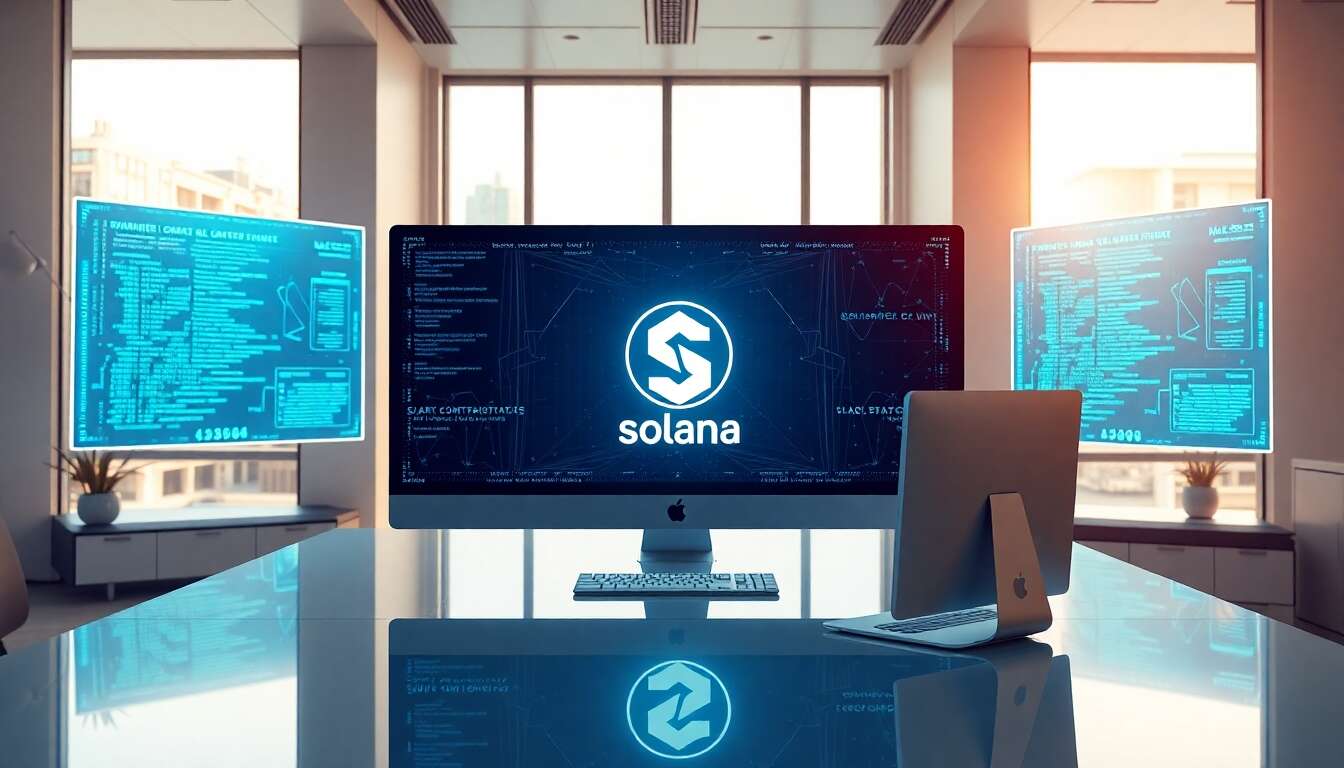Smart contracts have become a cornerstone of blockchain technology, offering a revolutionary way to conduct transactions and execute agreements without intermediaries. These self-executing contracts are written in code and automatically enforce and verify the terms of an agreement. With the rise of various blockchain platforms, Solana has emerged as a unique player in the field of smart contracts. Its innovative approach to blockchain technology, coupled with its speed and efficiency, sets it apart from other platforms.
What is a smart contract ?

Definition and characteristics
A smart contract is a self-executing program that automates the processes of an agreement between parties, eliminating the need for intermediaries. These contracts ensure transactions are transparent and immutable, boosting user trust through their decentralized nature. By being codified, smart contracts remove ambiguities often found in traditional agreements, providing clarity and precision.
How smart contracts work
The effectiveness of smart contracts lies in their ability to enforce terms automatically. Once specific conditions are met, the contract executes itself, ensuring that agreements are honored without human intervention. This automation not only streamlines processes but also reduces costs associated with traditional contract enforcement.
The concept of smart contracts is pivotal to understanding how they function on different blockchain platforms, including Solana, which brings additional features to the table.
Why are smart contracts on Solana unique ?
Programming on Solana
Solana’s blockchain is distinctively designed to handle smart contracts, often referred to as « on-chain programs ». These programs can manage various functions, such as:
- Native programs: These include essential operations like managing accounts and transferring SOL tokens between users.
- SPL programs: These are involved in activities like creating and exchanging tokens, managing lending, and staking protocols.
Solana’s innovation: Proof of History
One of Solana’s significant innovations is the Proof of History (PoH) mechanism, which sets it apart from other blockchains like Ethereum. This mechanism allows for efficient verification of the order and timing of transactions, eliminating the need for traditional mining processes. As a result, Solana can process transactions at remarkable speeds, enhancing the performance of smart contracts.
Solana’s unique features make its smart contracts particularly appealing for developers looking to leverage high-speed and low-cost blockchain solutions.
How smart contracts operate on Solana

Execution and scalability
Smart contracts on Solana operate with precision and speed due to the platform’s architecture. Solana’s network is capable of processing thousands of transactions per second, which is significantly higher than many other blockchains. This scalability enables developers to create applications that can handle large volumes of transactions efficiently.
Low transaction costs
The cost of executing smart contracts on Solana is exceptionally low, making it accessible to a broad range of users and developers. This affordability encourages the development and deployment of decentralized applications (dApps) without the financial burden usually associated with high transaction fees.
The efficient operation of smart contracts on Solana lays the groundwork for widespread adoption and innovation.
How to develop a smart contract on Solana
Development process
Developing a smart contract on Solana involves several key steps:
- Learning Rust or C: Solana smart contracts are primarily written in Rust or C, so proficiency in these languages is essential.
- Setting up the development environment: Developers need to configure their systems to work with Solana’s development tools and libraries.
- Writing and testing code: Once the environment is set up, developers write and test their smart contract code to ensure it functions as intended.
- Deployment: After testing, the smart contract is deployed on the Solana network where it can interact with other on-chain programs.
Resources and support
Solana offers extensive documentation and community support to help developers navigate the process of creating smart contracts. The active developer community provides a wealth of resources and forums for collaboration and troubleshooting.
Understanding the development process on Solana is crucial for those looking to harness the power of its smart contracts.
Advantages and challenges of Solana smart contracts
Advantages
Solana offers several advantages for smart contracts:
- Speed: With its ability to process thousands of transactions per second, Solana is one of the fastest blockchains available.
- Low fees: The minimal transaction costs make it an attractive option for developers and users alike.
- Dynamic ecosystem: Solana’s growing ecosystem includes a wide range of projects in DeFi, NFTs, and gaming, attracting a vibrant community.
Challenges
Despite its advantages, Solana faces some challenges:
- Network congestion: As with any blockchain, high demand can lead to congestion, affecting performance.
- Centralization concerns: Some critics point to potential centralization due to the network’s validator distribution.
The advantages of Solana’s smart contracts position it as a leading platform, but developers must also navigate its challenges.
Innovative applications of smart contracts on Solana

Revolutionizing industries
Smart contracts on Solana are transforming industries by enabling applications that were previously not feasible:
- Finance: Decentralized finance (DeFi) applications on Solana provide efficient and low-cost financial services.
- Supply chain management: Smart contracts improve transparency and efficiency in tracking goods and services.
- Gaming and NFTs: Solana’s speed and cost-effectiveness support complex gaming applications and the creation of NFTs.
Future prospects
As more developers and companies explore Solana’s capabilities, the platform is likely to see an expansion in the variety and complexity of applications. This growth is set to enhance Solana’s role in the blockchain ecosystem.
The innovative use of smart contracts on Solana showcases the platform’s potential in reshaping various sectors.
Smart contracts on the Solana blockchain offer significant advantages in terms of speed, cost, and innovation. The unique features of Solana, such as its Proof of History mechanism, make it an attractive platform for developers and businesses. As the ecosystem continues to grow, Solana is poised to play a crucial role in the future of blockchain technology, providing a robust foundation for decentralized applications and transforming how digital transactions are conducted.



